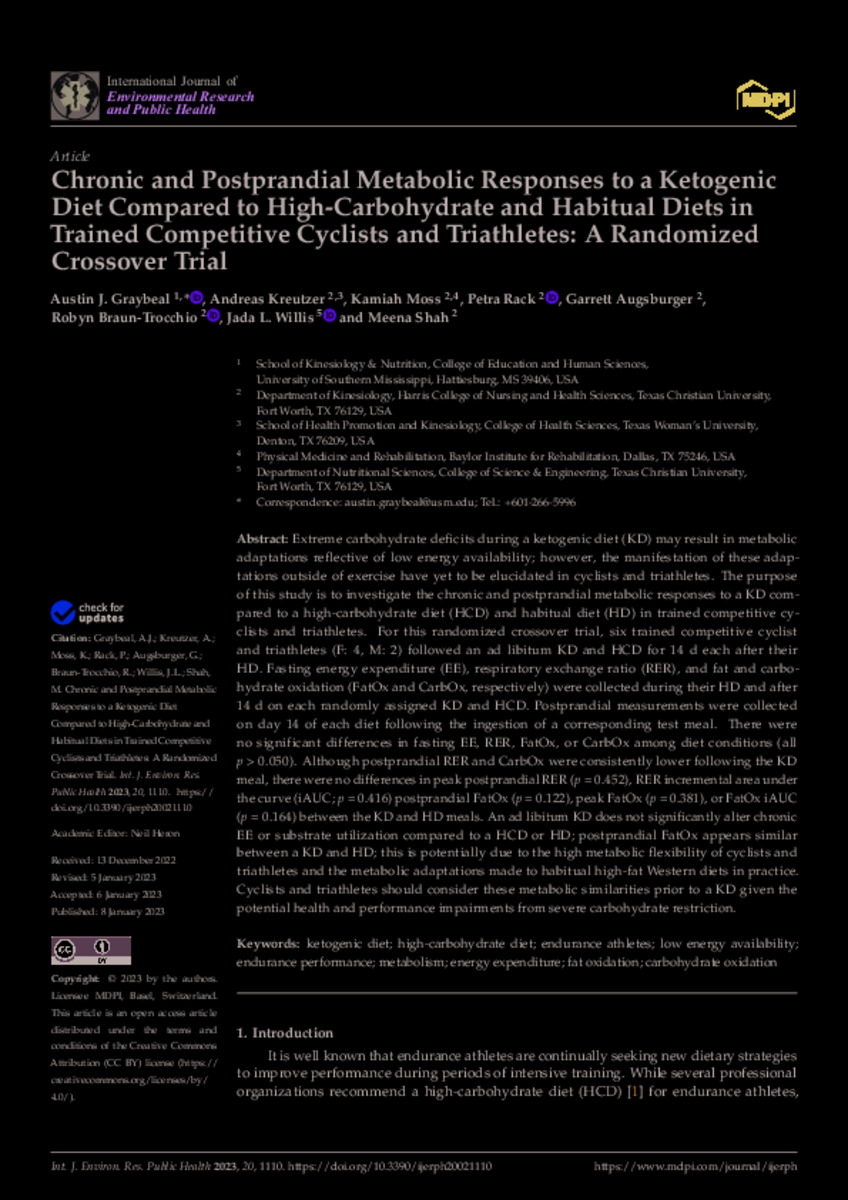Chronic and Postprandial Metabolic Responses to a Ketogenic Diet Compared to High-Carbohydrate and Habitual Diets in Trained Competitive Cyclists and Triathletes: A Randomized Crossover TrialShow full item record
| Title | Chronic and Postprandial Metabolic Responses to a Ketogenic Diet Compared to High-Carbohydrate and Habitual Diets in Trained Competitive Cyclists and Triathletes: A Randomized Crossover Trial |
|---|---|
| Author | Graybeal, Austin J.; Kreutzer, Andreas; Moss, Kamiah; Rack, Petra; Augsburger, Garrett; Braun-Trocchio, Robyn; Willis, Jada L.; Shah, Meena |
| Date | 2023 |
| Abstract | Extreme carbohydrate deficits during a ketogenic diet (KD) may result in metabolic adaptations reflective of low energy availability; however, the manifestation of these adaptations outside of exercise have yet to be elucidated in cyclists and triathletes. The purpose of this study is to investigate the chronic and postprandial metabolic responses to a KD compared to a high-carbohydrate diet (HCD) and habitual diet (HD) in trained competitive cyclists and triathletes. For this randomized crossover trial, six trained competitive cyclist and triathletes (F: 4, M: 2) followed an ad libitum KD and HCD for 14 d each after their HD. Fasting energy expenditure (EE), respiratory exchange ratio (RER), and fat and carbohydrate oxidation (FatOx and CarbOx, respectively) were collected during their HD and after 14 d on each randomly assigned KD and HCD. Postprandial measurements were collected on day 14 of each diet following the ingestion of a corresponding test meal. There were no significant differences in fasting EE, RER, FatOx, or CarbOx among diet conditions (all p > 0.050). Although postprandial RER and CarbOx were consistently lower following the KD meal, there were no differences in peak postprandial RER (p = 0.452), RER incremental area under the curve (iAUC; p = 0.416) postprandial FatOx (p = 0.122), peak FatOx (p = 0.381), or FatOx iAUC (p = 0.164) between the KD and HD meals. An ad libitum KD does not significantly alter chronic EE or substrate utilization compared to a HCD or HD; postprandial FatOx appears similar between a KD and HD; this is potentially due to the high metabolic flexibility of cyclists and triathletes and the metabolic adaptations made to habitual high-fat Western diets in practice. Cyclists and triathletes should consider these metabolic similarities prior to a KD given the potential health and performance impairments from severe carbohydrate restriction. |
| Link | https://doi.org/10.3390/ijerph20021110
https://repository.tcu.edu/handle/116099117/57387 |
| Department | Kinesiology Nutritional Sciences |
| Subject | ketogenic diet
high-carbohydrate diet endurance athletes low energy availability endurance performance metabolism energy expenditure fat oxidation carbohydrate oxidation |
Files in this item
This item appears in the following Collection(s)
- Research Publications [1008]
Related items
Showing a few items related by title, author, creator and subject.
-
Ketogenic and High-Carbohydrate Diets in Cyclists and Triathletes
Kreutzer, Andreas; Graybeal, Austin; Rack, Petra; Moss, Kamiah; Augsburger, Garrett; Willis, Jada L.; Braun-Trocchio, Robyn; Shah, Meena (2022)Endurance athletes frequently employ nutritional strategies to enhance performance. While professional organizations recommend high carbohydrate (HC) diets to maximize performance, many athletes, and researchers have ... -
Effect of a High-Fiber Diet Compared With a Moderate-Fiber Diet on Calcium and Other Mineral Balances in Subjects With Type 2 Diabetes
Shah, Meena; Chandalia, Manisha; Adams-Huet, Beverley; Brinkley, Linda J.; Sakhaee, Khashayar; Grundy, Scott M.; Garg, Abhimanyu (2009-06-01)Objective: High levels of dietary fiber, especially soluble fiber, are recommended to lower serum cholesterol levels and improve glycemic control in patients with type 2 diabetes. It is not clear, however, how high levels ... -
The Effect Of High-Fat, Western Diet Vs. Plant-Based, Mediterranean Diet On Alzheimer's Pathology In Mice
Munster, Claire (2020)Every 65 seconds, someone is diagnosed with Alzheimer's Disease (AD). Individuals suffering from AD experience both behavioral and psychological symptoms, such as cognitive decline, memory deficits, and confusion. Two ...
© TCU Library 2015 | Contact Special Collections |
HTML Sitemap






